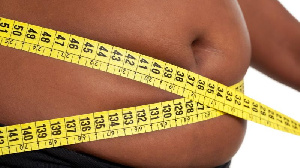BBC Pidgin of Saturday, 30 September 2023
Source: BBC
Wetin be Obsesogens, wey dey make us fat without say we chop
Wen we hear about obesity or overweight, di first tin wey go just enta our minds na unhealthy food or say di pesin no move much for dia life.
But anoda factor dey wey no dey popular but dey fight against our weight loss even wit di healthy lifestyle we dey live.
For recent years, e don dey known say some chemical compounds dey for di environment wey dey help pesin to dey overweight or create obesity for di population.
Dem dey call am obesogens and na dem dey cause increase for di mass of white adipose tissue or fat mass. And pesin fit catch am by food, contact or wen pesin breathe di polluted air.
Till now, around 50 chemicals don dey classified as obesogens or potential obesogens.
Dem include di famous bisphenol A, polchlorinated biphenyls, phthalates, polybrominated diphenyl ethers, perfluoroalkylated and polyfluoroalkylated substances, parabens, acrylamide, alkylphenols, dibutyltin and some heavy metals like cadmium and arsenic.
Dem be part of di many tins wey we dey use everyday like detergents, food, plastic package, cloth, cosmetics.
Adipocytes
How dem dey take make us fat?
True-true ehn, no be dis substances by demselves dey make pesin to get obesity. But dem dey use different ways to take promote excess weight.
For instance dem dey increase di amount and size of di fat accumulating cells wey dem dey call adipocytes.
Dat kain increase for di white adipose tissue fit contribute to obesity and oda metabolic diseases wen dem use inflammatory and oxidative stress reactions. Dis reactions fit come lead to make glucose and fatty acids to full berekete for inside plenti organs , most especially di liver.
E don dey observed say exposure to di obesogenic substances fit affect di actions of hormones like sex or thyroid hormones sake of di increase for adipose cells, weight gain and metabolism.
If dat one neva bad reach, dis compounds dem fit also affect di intestinal microbiota.
Dis na di millions of bacteria wey dey regulate lipid absorption so wen dem spoil e fit lead to metabolic diseases like type 2 diabetes or obesity.
Early Exposure
Wetin obesogens fit cause for bodi dey different and dey determined on wen pesin first catch am.
Di time wey e fit affect most na for di early stages of life, as foetus and for early childhood wen di development dey straightforward and sharp-sharp.
If anytin affect dis sensitive process, e fit affect di long term health of pesin.
Na wetin di Developmental Origins of Health and Disease Hypothesis (or DOHaD hypothesis) bin explain.
E tok say di environment around pesin for dia early development fit cause physiological changes wey fit make am dey catch some diseases easily for im later life.
Dat kain changes fit stay even afta wetin dey cause am no dey again.
Dis one fit happun for di case of obesity?
Well, scientifc evidence dey show say e fit happun. Exposure to those toxic substances wey don dey mentioned bifo for critical moments of development fit cause epigenetic changes, wey be changes for DNA wey no go affect di sequence.
Dis fit change di expression of di genes wey fit den change di function of di cells wey go increase di probability say pesin go develop obesity or oda metabolic diseases.
Animal sudies show say dis kain modification fit come move to di next generations.
Dat mean say pikin dem fit inherit di changes from dia parents.
How to avoid Obesogens
Even though dem dey everywia wit us for our daily lives, some tins dey wey we fit do as individuals wey go help us avoid dem.
Here be some tips:
- No smoke
- Reduce di amount of packaged foods and drinks you dey chop
- Reduce di kain plastics you dey use, plus including some kain lotion and cosmetics.
- Reduce di amount of food you dey chop wey get pesticides
- Reuse everytin you fit to use again
- Anoda tin be say make public health and environmental authorities develop policy wey go helep reduce pipo exposure to dis kain tins and also focus on di social inequalities for health.
E also dey important make dem do more research about obesogens.
So pipo wey dey now and di ones wey dem never born go fit get more informate wey dem go fit make decision wit.
*Raquel Soler Blasco na postdoctoral researcher for Environmental Health for di University of Valencia and Sabrina Llop na postdoctoral researcher for Miguel Servet, Fisabio.
Entertainment













